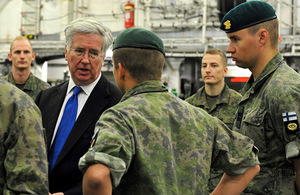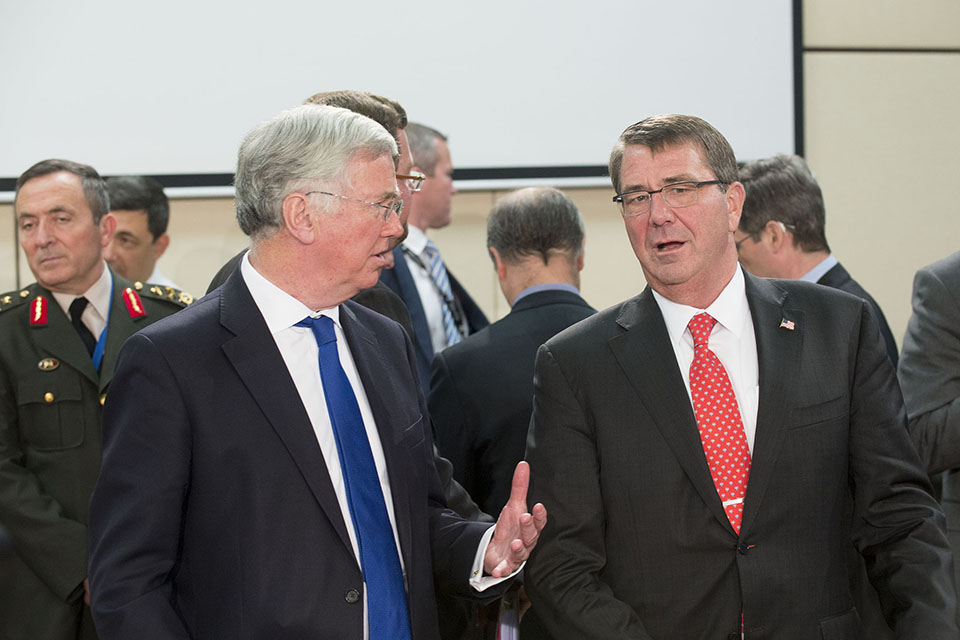UK to step up training of Ukrainian armed forces
At today's NATO Ministerial meeting in Brussels, the Defence Secretary announced the UK will step up its programme of training the Ukrainian armed forces.

Defence Secretary Michael Fallon met NATO Ally and Partner nations' forces on HMS Ocean during his visit to Exercise Baltops 2015 in June. The exercise brought together around 4500 personnel from 17 different countries, including the Royal Navy's flagship.
The move will build on an existing programme of medical, infantry, logistics and tactical intelligence training which has benefited 650 Ukrainians since March. Now, around 250 personnel will be trained in August alone in additional infantry, medical, and survival skills.
Further, a UK led NATO Trust Fund, co-chaired with Germany and Canada, will provide around 200 secure communication devices worth nearly £3m to the Ukrainian Armed Forces to improve their situational awareness and reduce casualties. The Trust Fund will also provide finance for a Regional Airspace Security Programme (RASP) designed to enable Ukraine to share air traffic information with its neighbours.
This latest package of support comes just days after Defence Secretary Michael Fallon outlined plans for the UK to contribute 1,000 troops to NATO’s Very High Readiness Joint Task Force (VJTF) every year into the next decade. He also committed Royal Air Force Typhoon jets to the Baltic Air Policing next year for the third year running.
Defence Secretary Michael Fallon said:
This stepping up of what has been a highly successful training scheme will mean more Ukrainian soldiers receiving vital training that will help them resist Russian aggression.
Alongside our new commitment to provide troops to the NATO’s new rapid reaction force and our decision to extend our contribution of British Typhoons to protect Baltic airspace, it shows that Britain stands at the heart of NATO and continues to support Ukraine’s territorial integrity.
The Defence Secretary held bilateral talks with a number of NATO counterparts, including US Defence Secretary Ash Carter, with whom he discussed a range of issues such as the Defence Investment Pledge - as NATO confirmed the UK is set to spend 2.1% of GDP on defence in 2015 - as well as Russian aggression in Eastern Europe, and the fight against ISIL.
Mr Fallon said:
I welcomed the opportunity to review with Ash Carter our shared approach to NATO’s collective defence as well as the fight against ISIL and instability in North Africa.
Britain is America’s strongest ally, and the new commitments we have both made to tackling the threats on NATO’s eastern and southern flanks show we will stand together to deter threats to international security.

Defence Secretary Michael Fallon met with US Defence Secretary Ash Carter during the NATO Defence Ministerial meeting to discuss common defence challenges for the UK and US [Picture: NATO]
Meeting with other Defence Ministers in Brussels, Mr Fallon explained that in 2017, the UK will lead the VJTF Brigade with an enhanced contribution of up to 3,000 personnel which will include the Brigade Headquarters, armoured infantry and light role infantry battlegroups, plus communications, reconnaissance, intelligence, combat support and logistic elements. And he disclosed that next year, the 2nd Battalion, The Mercian Regiment (2 MERCIAN) a light role infantry battalion, will form part of the Spanish-led VJTF.
The Ministerial meeting provided an opportunity to underline NATO’s commitment to step up efforts to counter Russia’s sophisticated use of misinformation. The Defence Secretary, who has been clear that the UK is determined to do more in this area, pledged £750,000 towards both building NATO and Partners’ strategic communications capacity, with the UK deploying a strategic communications expert to Georgia to support this work.